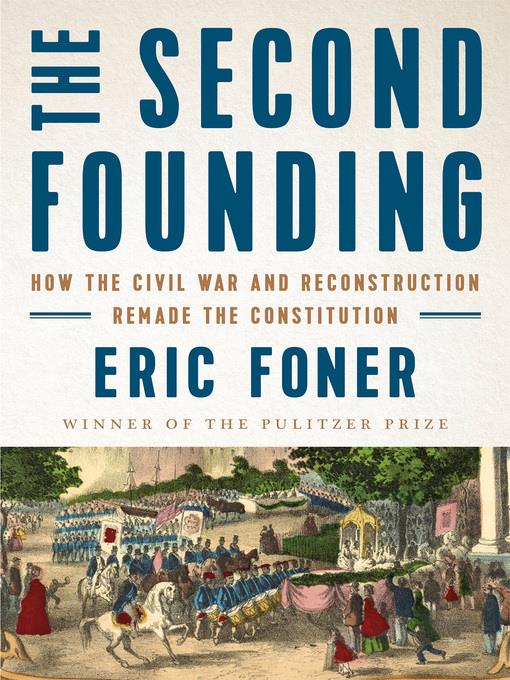
The Second Founding
How the Civil War and Reconstruction Remade the Constitution
کتاب های مرتبط
- اطلاعات
- نقد و بررسی
- دیدگاه کاربران
نقد و بررسی

June 24, 2019
In this lucid legal history and political manifesto, Pulitzer Prize–winning historian Foner (The Fiery Trial) explores how the “Reconstruction amendments”—the 13th, 14th, and 15th, which abolished slavery, granted birthright citizenship, and acknowledged black men’s political rights—have been interpreted over the past century and a half. Foner begins with Congressional debates immediately after the Civil War about what “freedom” could and should mean in the context of the liberation of hundreds of thousands of slaves. Most relevantly for today, Foner depicts the disagreement among both Democrats and Republicans about who should have, and be allowed to use, the right to vote. He points out that, as recently as 2013, the Supreme Court has failed to use the 15th Amendment to oppose state laws that, while not specifically mentioning ethnicity or race, make it difficult for nonwhite citizens to vote, and has refused to bar discriminatory practices of private citizens, in seeming contradiction to the 14th Amendment. In Foner’s view, the current moment represents a “retreat from racial equality,” but the rights promised in these amendments also remain “viable alternatives.” Readers invested in social equality will find Foner’s guarded optimism about the possibility of judicial activism in this area inspiring, and both casual readers and those well-versed in American legal history will benefit from his clear prose and insightful exploration of constitutional history.

July 1, 2019
Schoolchildren learn that the Constitution did not solve the slavery question. That required the Civil War and the 13th, 14th, and 15th amendments, which dramatically altered how we are governed. This engrossing scholarly history recounts how it happened. Pulitzer Prize-winning historian Foner (Emeritus, History/Columbia Univ.; Battle for Freedom: The Use and Abuse of American History, 2017, etc.) reminds readers that the Emancipation Proclamation freed some slaves, and the 1865 surrender of Confederate armies freed none. Abolition required the 13th Amendment. Abraham Lincoln stayed neutral as the 1864 Congress debated it. He was in a tight presidential race, and supporting black rights was not a vote-getter. Initially, the amendment failed, with most Northern Democrats opposed, warning that it would lead to black voting and interracial marriage. After the election, in which Republicans increased their majority, it passed. Soon, it became apparent that Lincoln's successor, Andrew Johnson, a vehement racist, was encouraging white supremacists to form governments in former Confederate states. In December 1865, Congress refused to admit their representatives and proposed what became the 14th and 15th amendments. The 14th, the longest in the Constitution, was meant to "establish the rights of the freed people and all Americans; create a uniform definition of citizenship; outline a way back into the union for seceded states; limit the political influence of leading Confederates; contribute to the nation-building process catalyzed by the Civil War; and serve as a political platform that would enable the Republican Party to retain its hold on power." The 15th, which prohibited denying voting rights based on race, was controversial even in the North. No congressional Democrat voted for it, and post-Reconstruction Southern governments had no trouble disenfranchising blacks. Foner emphasizes that these revolutionary amendments were poorly drawn, difficult to enforce, and not widely popular among whites. Nearly a century passed before the protection of due process, individual rights, and racial equality won over the courts and many, if not all, whites. A convincing but definitely not uplifting account of how Reconstruction drastically changed our Constitution.
COPYRIGHT(2019) Kirkus Reviews, ALL RIGHTS RESERVED.

Starred review from July 1, 2019
Foner (De Witt Clinton Professor Emeritus of History, Columbia Univ.), doyen of scholars on the Reconstruction era, whose Reconstruction: America's Unfinished Revolution, 1863-1877 presents a seminal work on the topic, here focuses on the changes wrought on the U.S. Constitution by the Civil War and Reconstruction. When first adopted, the Constitution's power was vested in the states. The conclusion of the war saw the federal government seize preeminent authority through the passage of the 13th, 14th, and 15th Amendments. Those amendments abolished slavery, provided due process and equal rights under the law to African Americans, and granted black men the right to vote. Foner details how the freedmen engaged in the political process, only to see the very rights granted to them eroded during Reconstruction. The federal government's abandonment of the principles it ensconced in the three landmark amendments set the stage for the subsequent imposition of Jim Crow laws throughout the South. Foner brilliantly shows that the federal government's actions in the 19th century continue to resonate today. VERDICT A must-read for anyone interested in U.S. history.--John R. Burch, Univ. of Tennessee at Martin
Copyright 2019 Library Journal, LLC Used with permission.

























دیدگاه کاربران